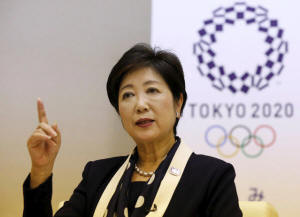|
Poor
supervision behind rising 2020 costs: panel head
 Send a link to a friend
Send a link to a friend
 [November 02, 2016]
By Elaine Lies [November 02, 2016]
By Elaine Lies
TOKYO (Reuters) - Poor supervision and
a lack of clear authority is one reason costs for the Tokyo 2020
Olympics have soared to more than four times original estimates, the
head of a Tokyo panel tasked with slashing expenses said on
Wednesday.
Tokyo Governor Yuriko Koike, who took office in August, ordered a
review of Olympic expenses that recommended changing three venues in
an effort to rein in costs projected to hit 3 trillion yen ($28.87
billion), four times initial estimates when the city won the right
to host the Games.
Attention has focused on the rowing and canoe/kayak sprint venue,
originally set to take place at a new Tokyo facility, the cost of
which has surged to around 52 billion yen, nearly seven times higher
than the original budget.
The Tokyo review panel headed by Shinichi Ueyama, also a professor
at Tokyo's Keio University, on Tuesday proposed changes that could
cut as much as 50 billion yen from the total bill.
On Wednesday, he blamed a good part of the situation on a lack of
clear oversight of expenses.

"There is no proper mechanism in place to manage the entire budget,
a real lack of governance," Ueyama told a news conference.
Ueyama noted that while each organization involved in the Olympics
had its own chief executive officer (CEO) and chief financial
officer (CFO), they only oversaw the budget for their own group.
"There is nobody who has authority equivalent to a CEO or CFO as
there is in a usual company, and this is a source of great concern
to us," he added.
The Tokyo government, national government, Tokyo 2020 Organising
Committee and the Japan Olympic Committee are all involved in
pulling the games together.
At the end of September, Ueyama's panel recommended a number of
cost-cutting changes, including moving the rowing and canoe/kayak
sprint venue to an existing one 400 km (250 miles) north of the
capital. The suggestion is opposed by Tokyo 2020 organizers and
sports officials.
[to top of second column] |

Tokyo Governor Yuriko Koike speaks in front of Tokyo 2020 Olympics
emblem during an interview with Reuters at Tokyo Metropolitan
Government Building in Tokyo, Japan, October 12, 2016. REUTERS/Toru
Hanai

On Tuesday, in its final report, the panel said costs could be
shaved by converting permanent facilities to temporary ones, or by
scaling back plans for permanent facilities to build them more
cheaply.
Shifting the rowing venues to northeastern Japan would require an
outlay of 35 billion yen to bring them up to Olympic standard but
officials have also touted this as helping to regenerate areas hit
by the 2011 tsunami, one of Prime Minister Shinzo Abe's selling
points when Japan originally won the Games.
International Olympic Committee (IOC) President Thomas Bach met with
Koike last month and agreed to form a working group comprising
Tokyo, the central government, 2020 organizers and the IOC to find
ways to avoid wasteful spending.
The first meeting began on Tuesday and ends Thursday.
(Editing by John O'Brien)
[© 2016 Thomson Reuters. All rights
reserved.] Copyright 2016 Reuters. All rights reserved. This material may not be published,
broadcast, rewritten or redistributed.
 |